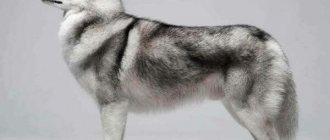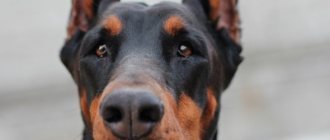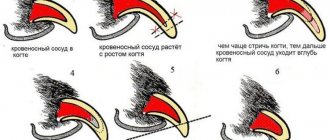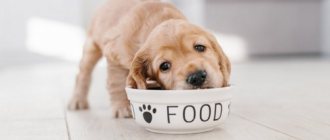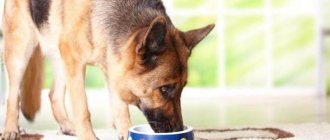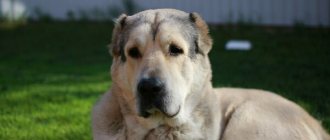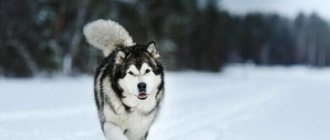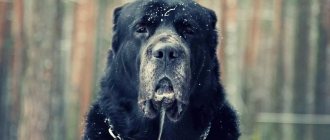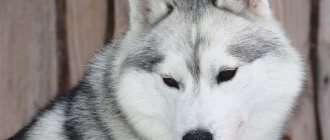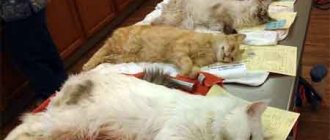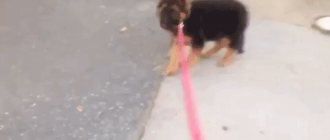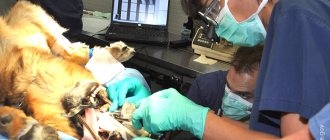If you decide to get a dog, it is best to take a puppy under three months of age. After all, it is during this period that basic behavioral habits and skills are laid, and phobias are formed.
At this time, puppies are easy to train. They are accustomed to a new family and owner, feeding, discipline, hygiene, walking and basic commands. Since puppies of this age respond well to positive emotions, it is best to train them using the “carrot” method. This could be a small treat given after each positive result.
Puppies can be taught a lot at an early age. For example:
- Don't jump on people;
- Sleep at night and behave calmly;
- During a walk, do not run far from the owner;
- Calmly wait for the food to be served;
- Do not chew shoes and clothes;
- Learn the necessary commands “fu”, “place”, “near”, etc.
Meet the family
The puppy gets used to the new family and place of residence through communication and spending time together. It is very important to treat your new pet with care and kindness. Do not make your puppy feel timid, afraid and helpless, and then he will trust you. It is under such conditions that the so-called good contact arises.
During this period, it is very important to form close contact between the owner and the animal. This will speed up the process of training, educating and training the dog. Therefore, it is the owner who must devote the greatest amount of time to the dog and teach basic skills. The rest of the family can participate in raising the puppy, but only when necessary.
Whether contact has been established can only be determined by the dog’s behavior. If she whines, waits at the door during your absence, runs after you, caresses you, strives to play with you and attracts your attention in every possible way, then you have succeeded.
5-6 months - environmental awareness
At this time, the dog begins to expand its living space and remember it. Now you need to consolidate the previously learned rules of communication and behavior. If the baby was separated from its mother at the age of 3-4 months, then it has well learned species-specific social behavior. He knows well how to behave with adult animals, when to play and when not to. Can “read” the sign language of its relatives. All that remains is to secure it.
If the puppy was taken early, the owner himself must teach him the rules of behavior with other dogs. Under no circumstances should it be isolated. He must communicate with his own kind. Socialization is a very important stage. If you miss it, it may affect the psychological state of the mature dog. This can be expressed in fearfulness or aggression at the sight of strange animals, in panic or depression in the absence of the owner. Between 5 and 6 months the dog becomes independent and requires a firm hand to get through the rebellious period of puberty.
Regular feeding
Establishing a routine begins with feeding. Regular provision of access to water, as well as feeding, does not require special knowledge or skills from you. It's just a necessity of life. Moreover, when a puppy is taken away from its mother, breeders already accustom it to a wide variety of food. It is important to feed and water your pet regularly, at approximately the same time. In addition, it is necessary to provide a high-quality diet that contains the amount of food, vitamins and microelements necessary for his age, breed, size.
Underfeeding or overfeeding should not be allowed. In the first case, this will negatively affect the development of the puppy, and in the second, it will affect the digestive system and provoke obesity.
First two weeks
Puppies are completely dependent on their mother for the first two weeks. Immediately after birth and in the next few days, they still do not see or hear. Their movement is based on reflexes - they only look for a source of heat, which is the bitch, in order to eat. At this stage, the person's role is to monitor the feeding process.
All babies should have equal access to nipples. This is very important when the litter is large and there are not enough nipples for all the babies. As a rule, the stronger ones start feeding first, and those who are weaker may simply not have enough milk.
Experienced breeders advise dividing puppies into two groups and applying the weaker ones to the nipples first.
In addition, it is necessary to ensure optimal temperature conditions for the bitch with a litter. Babies have very poor thermoregulation and can become hypothermic. It is best to prepare a “house” with a convertible top for a dog family. This design allows easy access and allows you to regulate the temperature inside.
Make sure that the bitch does not accidentally crush the babies during sleep or that they do not crawl far away from her. Puppies should not be separated from their mother for several days after birth; it is best not to disturb them. Too much attention can irritate the bitch, and babies don't need human contact yet. Only in the second week can you gently stroke them or pick them up.
Important: do not take puppies away from the bitch for a long time.
Place
A new pet must be accustomed to its place from the first days of life in your home. This is a specially equipped area where the dog will rest and sleep. It also serves as a temporary “shelter” in situations where the dog may disturb people (cleaning, eating, etc.).
An obedient dog is not difficult!
The “My Puppy” course will help you raise your puppy into the dog of your dreams.
sign up for a course
It is not difficult to accustom a small puppy to its place, but it will take a lot of time. To begin with, every time your pet goes to bed somewhere, you need to move it to its place. Moreover, you need to place it directly on the mat immediately after the “Place” command. When you have already put it down, you need to repeat the command and pet the puppy.
At first, the puppy will try to run away, but it’s worth holding him for a while, repeating the “Place” command and petting him again. Then you can let go. For the best effect, this exercise must be repeated about 4 times a day.
This can be done not only during sleep. You also need to develop the skill of leaving on command. This will come in handy when the puppy begs for food at dinner or plays with the vacuum cleaner while cleaning. You just need to take into account that leaving on command is somewhat more complicated than just sleeping in one place. If it was not possible to teach this at the age of 1-3 months, then it is better to try again a little later.
Diseases and treatment of puppies, puppies from 3 to 6 months
Your puppy will need regular veterinarian visits for puppy vaccinations, dewormings, and routine checkups between 8 and 16 weeks of age.
During this time, it is important to keep your puppy away from unknown animals and public places where there might be other animals. Once vaccinations are complete and your veterinarian has cleared everything, your puppy can begin going for walks, visiting the park, and playing with other dogs (under close supervision, of course).
After four months of age, most puppies will not need routine veterinary visits until adulthood.
At your puppy's last visit (usually at rabies vaccination, around 16 weeks of age), be sure to ask any remaining questions. Talk to your veterinarian about the best way to care for your fast-growing puppy.
If your dog will be spayed or neutered, it is often done between five and six months of age. Ask your veterinarian for personalized recommendations for your dog. The ideal age for spaying or neutering may vary depending on the breed and size.
Hygiene
Washing and cleaning must be taught from an early age. There are usually no difficulties in this. You just need to do everything carefully, without harming the baby. The water temperature should be comfortable for the dog; cold or hot water is not allowed. Then bathing will evoke only positive emotions, and the already mature dog will willingly run to the bathroom. This also applies to cutting or combing. The main thing is to be careful, because any pain and fear has its consequences. After some negative experience, the pet simply does not want to repeat the procedure again.
Learning to walk
The main thing in the ability to walk is for the puppy to calmly react to stimuli, not get scared, not jump out onto the roads and move clearly at the owner’s left foot. Does your puppy break from its leash? Pull the leash and command “Quiet!” Does not help? Repeat the command and lightly tug the leash. Didn't help again? Say “Here” and let your puppy follow the command. Later, you can release the puppy by giving the command “Walk.” There is no need to accompany the command with a gesture, since the gesture allows the dog to move away from the owner. The command simply lets the dog know that it is forbidden to move away from the owner, you can only change position.
It is very important that the puppy learns to cross roads correctly. Before stepping onto the roadway, give the command “Nearby”. Is the puppy trying to get off the road on its own? Command “Come to me!” and use a tug on the leash to return the dog to the sidewalk. Read more "
Punishment
Many people are interested in: “What can and what can’t you punish a little puppy for?” At this age it is better to do without punishment. They definitely will not give the required result, and the nervous system and mutual understanding will be damaged. We strongly recommend that you learn the list of things you should absolutely not punish a 3-month-old puppy for.
- Heaps and puddles at home. At this early age, the daily routine has not yet been adjusted, and one has not yet learned to tolerate it.
- Damaged material assets and things. You cannot blame the puppy for damage. Most likely, you didn’t remove it, forgot it, or left it in a visible place. All valuables should be kept out of reach. And if you have exposed wires and cables, take care of cleaning them up immediately. This is a favorite toy of small puppies, and it is also unsafe.
- Running and active games. At this age, puppies are distinguished by their mobility. They have more than enough energy. It is better to walk your pet more often.
- Biting off wallpaper and pieces of walls. If your dog regularly chews or licks walls, you should consult a doctor. He may be lacking minerals.
- Playing with the hands and feet of family members. This habit is characteristic only of small puppies, and as they grow older, it goes away. Usually such games become uninteresting to him after 4 months.
Do you have a special situation?
Our specialists met with everyone. They share their experiences in detail in our online school!
more details
Changes in behavior
Your 12-week-old puppy is nearing the end of a critical socialization window. Make the most of this period of time by introducing your dog to new people, places and things.
Until your dog is fully vaccinated, he should not be around unknown animals or on the ground in public places. Try to have a variety of people and healthy animals come into your home so that they are happy with their puppy.
You can take your dog to a home where you know the animals are vaccinated and healthy. Carry your dog in public places, exposing it to loud noise, falling objects and small crowds of people.
Work on handling exercises to get your puppy used to being handled. Always maintain a positive and optimistic attitude when interacting with your puppy.
Puppies usually experience a period of fear around 16 weeks of age. This is a normal part of your puppy's social development as he learns to respond to his environment.
Avoid squeezing your puppy when you notice a fearful reaction. This is not the time for loud noise, falling objects or crowds. It is also important not to reward fearful behavior, otherwise you will validate your puppy's fears.
Instead, ignore the fearful behavior and carefully remove the puppy from the source of the fear. Instead, reward calm and happy behavior.
A dog's adolescence usually begins at about six months and lasts from 18 months to 2.5 years, depending on the breed.
Expect to see a bit of rebellion in your puppy as he begins to test his limits. You may notice that your dog is ignoring cues that he has previously been trained to use.
At this stage, she may also have destructive chewing (caused by a combination of teething, juvenile misbehavior, and possibly boredom). Make sure your puppy gets plenty of exercise and exercise regularly. Be consistent and firm.
Promotion
As we said earlier, a small puppy needs to be constantly encouraged. It is important to always carry some kind of treat with you, and reward the baby for any positive result in training (following a command, obedience, etc.).
Hard cheese is perfect for small puppies. You need to cut it into small pieces and always have it with you. Moreover, it is very important to think about the size of the treats. After all, the baby will not taste a piece that is too small and will no longer be interested, but a large piece will satisfy him the first time. In this case, motivation also disappears.
The optimal treat is something the size of a small pea. Moreover, regular dry food will not work. After all, it is given strictly according to the dosage, and the puppy can choke on the dried food. And the cheese is suitable because it does not stain your pockets, is easy to cut and dries. And dogs simply adore him.
These are the basic rules for raising and training small puppies. Follow them and then you will quickly find mutual understanding with your new favorite.
Additional supplements and treats
In addition to basic products, the following additives can be included in the daily diet of a little barbosie:
- Chalk.
- Crushed quail shell.
- Honey (teaspoon per day).
- Fish oil (teaspoon per day).
- Brewer's yeast.
- Bran.
- Laminaria.
- Sprouted cereal seeds.
- From 3 months you can give beef cartilage and chicken necks.
- From 5 months, you can already include beef tripe and other offal in your baby’s diet.
